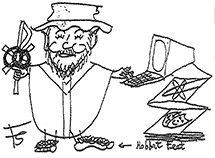“It is more blessed to give than to receive.”
This is one of the Equations of Love - but is it an equation? It is true that there are traditions of never receiving a gift unless something, even a token penny, is given in return.
And there are those who balk at receiving gifts: they don’t want to be obliged, they don’t want charity, they don’t want to be unequal, vulnerable.
But if you will not receive what is given, you forever remain unequal!
St Paul used a word for self-giving love, Christian love, and the King James translators chose to use “charity” from Latin “caritas” to distinguish this kind of love. But “charity” has come to have some selfish connotations.
Charity has often been called “cold charity”. This is a long way from true giving. If a small toddler, barely able to keep on her feet, picks a little flower and holds it up saying, “for you, Mummy” - is that cold? Surely it is self-giving love from a child: it is as little children, the Gospel says, we must enter ”heaven.”
The equation comes into play when we realize that the receiver of a gift can give pleasure, satisfaction, equality even, by passively receiving what the giver presents. The subtext of our Biblical quote then is: “It is also blessed to receive with joy and to be open to receive.” Giving and receiving increase intimacy between the parties: but closed-in people shy away from intimacy.
Social science would say that the Giver and the Receiver are a “system,” that they are connected through the gift and further interchange, and that each party affects the whole relationship.
I first encountered ”systems theory” when, 25 years ago, my parish was invited to go with other church groups to examine our parish life in what was called (awkwardly, we thought) a “systems approach.” The process was so impresssive that one our folks, a chief librarian, went home and revised her working relationship with her staff and customers!
Later on, pursuing the systems approach I read some works by impressive names like “von Bertalanffy” and “Ervin Laszlo”. The latter is still active, analysing social systems and relationships. One of the great systems people I met , the economist Kenneth Boulding, used his serious stammer to highlight his doggerel verse:
The great Christian doctrine of Love
exerts a great pull from above:
when the love that we know
often comes from below, (deep breath and stammer)
thus turning the pull to a shove
This doggeral introduces a top-down and bottom-up element into the argument!!
Systems theory in thermodynamics and in biology shows that closed systems do not lead to progress or change, whereas open systems can bring about change and innovation. For example, in biology, cancerous growth can be seen as cellular development that shuts off the normal interactions with healthy cells, and buiild up a hostile closed system in their place. In neurology, the “evil” protein of Altzheimer’s cuts off the normal open functions of neurons in interaction with each other. In sociology the encrustation of institutions leads to their destructive effects on healthy and changeable community life.
I return to moral philosophy. If the Giver were wholly “closed” there would be no gift: the Receiver must needs be open enough to receive without closing. When there is trouble, even the gift of courtesy on either side can open connections and break down barriers, to create new situations.
Next week we shall look further into Giving becoming Forgiving, Receiving becoming Accepting Forgiveness; after that, we move to Thanks-giving and Grace-giving.
More Equations of Love

